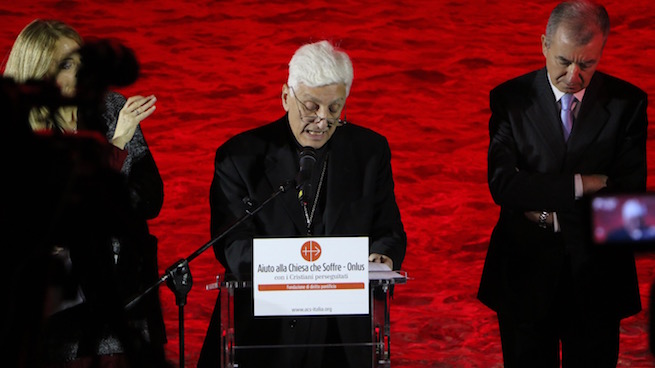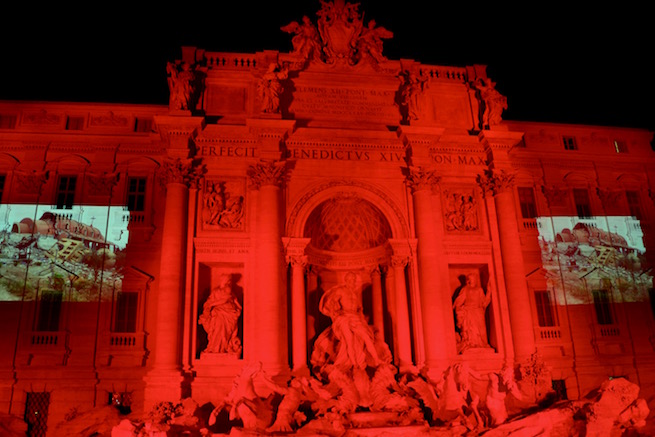Rome's Trevi Fountain Illuminated Red to Remember Persecuted Christians
Bishop Audo warns of the end of the Church's presence in the Syrian city of Aleppo.
.jpg)
Losing the Christian presence in Syria would be something "very, very dangerous for the universal Church, for the Muslim people, and for ourselves”, warned Bishop Antoine Audo of Syria's second largest city, Aleppo.
The Chaldean bishop was speaking to the Register after addressing crowds in Rome who had gathered at the city's Trevi Fountain in the evening of April 29. The famous landmark was colored red to honor and remember the blood of persecuted Christian martyrs. The number of Christians being persecuted for the faith is estimated to total 200 million around the world.
The event, which drew a large crowd, included a series of testimonies and ended with a prayer. Its aim was to show solidarity with the persecuted, reassuring them they are not suffering alone.
Bishop Audo drew attention to the richness and diversity of Christianity in Syria, where the faith has been present for two millennia. “We have the capacity to live with Islam,” he said. “We are inculturated within the Arab culture."
But he said the situation is now "very bad”, especially in his city, ravaged by the continuing civil war in the country. “There is constant indiscriminate bombing leaving a lot of victims, many wounded. There is no work, no electricity, life is very expensive, and the number of churches is drastically decreasing. For us, we’re experiencing the end of a church and of [Christian] tradition.”
This week the United Nations said the situation in Aleppo was "catastrophic", after airstrikes on and around a Médecins Sans Frontières backed hospital killed dozens, with more than 30 dead in other attacks. The Red Cross has warned Aleppo is on the brink of a humanitarian disaster with millions of lives at risk.
Bishop Audo said the evening, organized by the charity Aid to the Church in Need, was important because it helped take the issue of persecuted Christians, particularly in Syria, “out into the world.”
“We speak generally, usually within churches and some newspapers,” he said, “but this is taking place in front of a very big symbol: Fontana di Trevi. It is a courageous desire to express peace and justice and be ready to fight for it.”
Among those present at the event were Missionaries of Charity Sister Hesed, who had served alongside the four sisters of her Order who were killed in Yemen in March; Shahid Mobeen, a friend of Shahbaz Bhatti, the Pakistani minister of religious affairs who was gunned down in 2010; and the sister of Don Andrea Santoro who was killed in Turkey a decade ago. Also present was a student called Luka, many of whose classmates were massacred by Islamist militants in Garissa, Kenya, last year.
The secretary general of Italy’s bishops, Bishop Nunzio Galantino, said the event reminded those present to keep the persecuted “at the forefront" of people's minds in prayer and remembrance, because "the first to suffer persecution are the followers of Christ."
Bishop Audo said he hopes for a “political solution for peace" because "all humanity, together with Christians, are living in fear."
Economic considerations “mustn’t be the first goal” of developed nations, he said. “It’s not right to kill people in order to have a good standard of living in Europe”, he added, and strongly condemned the arms trade.
Asked what the average Catholic layman could do to help, he replied: “Pray for us and listen to the right sources. Don’t trust television which always serves as propaganda for powerful countries.”
He said he was sure the Pope is “doing what he can” but felt that he and the Holy See could always “do more.” Bishop Audo appealed to foreign ministers and embassy staff around the world to exert “pressure on the U.S. and Russia to bring about peace.”

.jpg)


.jpg)

Top photo: Bishop Antoine Audo addressing the crowds at the Trevi Fountain, April 29, 2016
Photos/Video: Edward Pentin/NCRegister.com
- Keywords:
- aid to the church in need
- bishop antoine audo
- christian persecution
- middle east
- persecution
- rome
- trevi fountain

















